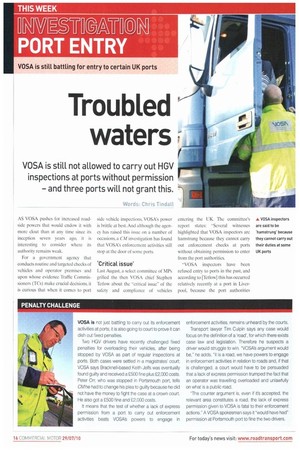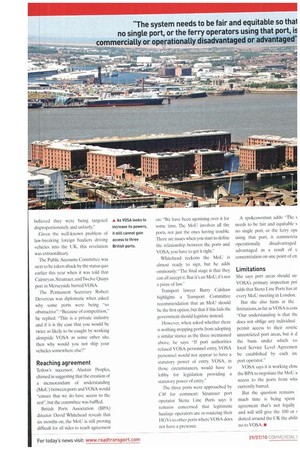Troubled waters
Page 16

Page 17

If you've noticed an error in this article please click here to report it so we can fix it.
VOSA is still not allowed to carry out HGV inspections at ports without permission and three ports will not grant this.
Words: Chris Tindall AS VOSA pushes for increased roadside powers that would endow it with more clout than at any time since its inception seven years ago, it is interesting to consider where its authority remains weak.
For a government agency that conducts routine and targeted checks of vehicles and operator premises and upon whose evidence Traffic Commissioners (TCs) make crucial decisions, it is curious that when it comes lo port
side vehicle inspections. VOSA's power is brittle at best. And although the agency has raised this issue on a number of occasions, a CM investigation has found that VOSA's enforcement activities still stop at the door of some ports.
'Critical issue'
Last August, a select committee of MPs grilled the then VOSA chief Stephen Tetlow about the "critical issue" of the safety and compliance of vehicles entering the UK. The committee's report states: "Several witnesses high lighted that VOSA inspectors arc hamstrung because they cannot carry out enforcement checks at ports without obtaining permission to enter from the port authorities.
"VOSA inspectors have been refused entry to ports in the past, and according to [Tetlow] this has occurred relatively recently at a port in Liverpool, because the port authorities believed they were being targeted disproportionately and unfairly."
Given the well-known problem of law-breaking foreign hauliers driving vehicles into the UK, this revelation was extraordinary.
The Public Accounts Committee was next to be taken aback by the status quo earlier this year when it was told that Cairnryan, Stranraer, and Twelve Quays port in Merseyside barred VOSA.
'Ihe Permanent Secretary Robert Devereux was diplomatic when asked why some ports were being "so obstructive": "Because of competition," he replied. "This is a private industry and if it is the case that you would be twice as likely to be caught by working alongside VOSA as some other site. then why would you not ship your vehicles somewhere else'?"
Reaching agreement Tetlow's successor, Alastair Peoples, chimed in suggesting that the creation of a memorandum of understanding (MoU) between ports and VOSA would "ensure that we do have access to the rest", but the committee was baffled.
British Ports Association (BPA) director David Whitehead reveals that six months on, the MoU is still proving difficult for all sides to reach agreement on: "We have been agonising over it for some time. The Moil involves all the ports, not just the ones having trouble. There are issues when you start to define the relationship between the ports and VOSA; you have to get it right."
Whitehead reckons the MoU is almost ready to sign, but he adds ominously: "The final stage is that they can all accept it. But it's an MoU, it's not a piece of law."
Transport lawyer Barry Culshaw highlights a Transport Committee recommendation that an MoU should be the first option. but that if this fails the government should legislate instead.
However, when asked whether there is nothing stopping ports from adopting a similar stance as the three mentioned above, he says: "If port authorities refused VOSA personnel entry, VOSA personnel would not appear to have a statutory power of entry. VOSA, in those circumstances, would have to lobby for legislation providing a statutory power of entry."
The three ports were approached by CM for comment: Stranraer port operator Stena Line Ports says it remains concerned that legitimate haulage operators are re-routeing their 11G Vs to other ports where VOSA does not have a presence. A spokeswoman adds: -The s needs to be fair and equitable s no single port, or the ferry opt using that port, is commercia operationally disadvantaged advantaged as a result of u concentration on one point of en Limitations She says port areas should ne VOSA's primary inspection poi adds that Stena Line Ports has at every MoU meeting in London.
But she also hints at the limitations,as far as VOSA is cont "Our understanding is that the does not oblige any individual permit access to their restric unrestricted port areas, hut it d the basis under which vo local Service Level Agreemen be established by each inc port operator."
VOSA says it is working cies( the BPA to negotiate the MoU access to the ports from whit currently barred.
But the question remains much time is being spent agreement that's not legally and will still give the 100 or dotted around the UK the abilii no to VOSA. •




























































































































